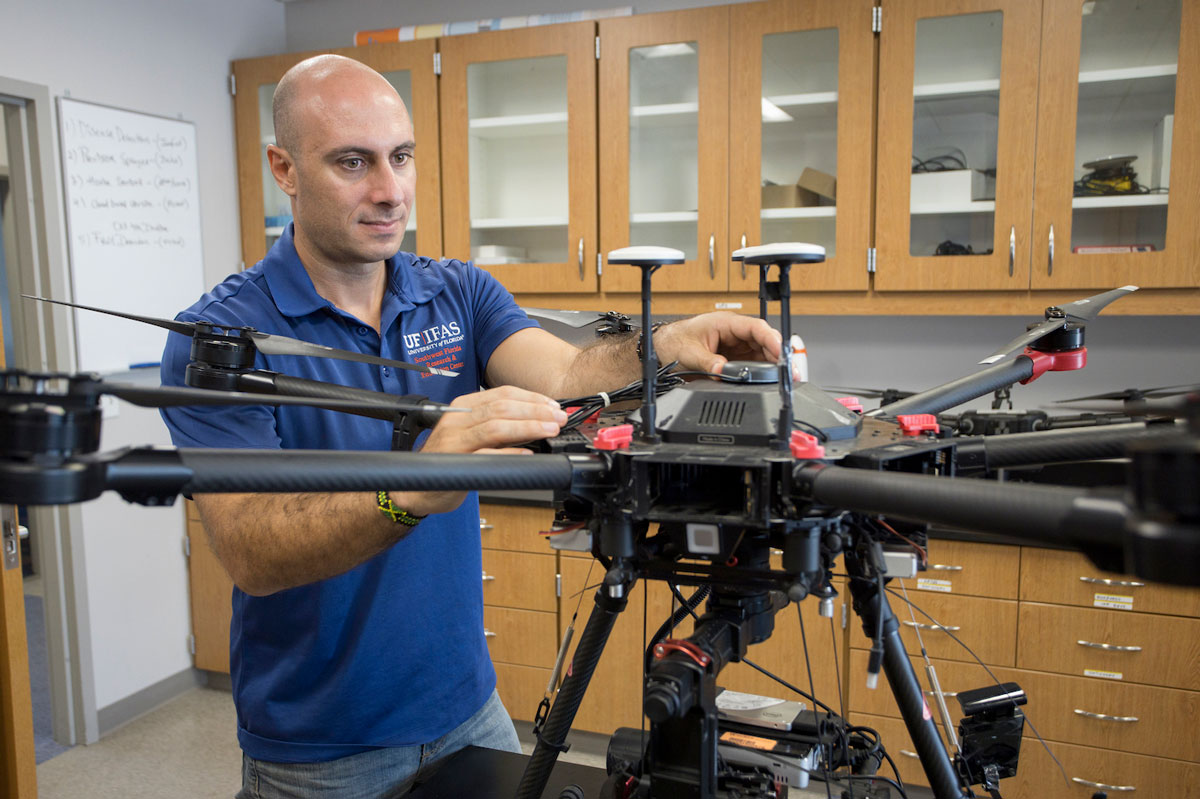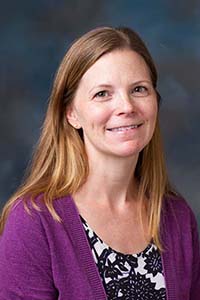Scientists and farmers see ways to make AI useful to agriculture

AI tools such as Agroview, invented by UF/IFAS agricultural engineer Yiannis Ampatzidisis, are increasingly being used to help farmers increase their economic and environmental sustainability. Photo: UF/IFAS
In a groundbreaking, first-of-its kind event, university scientists, engineers, producers, government agencies and industry officials from throughout the South met at Auburn University to brainstorm ways to use artificial intelligence to help farmers.
The bottom line from participants: They can empower farmers and equip farms to increase their economic and environmental sustainability and develop resilient solutions to address climate change by using AI. The key is working together to make sure solutions fit problems and are viable in agricultural systems, from field to fork.
The three-day conference, held March 9-11 and titled, Envisioning 2050 in the Southeast: AI-driven Innovations in Agriculture, was the brainchild of Brenda Ortiz, an Auburn professor of crop, soil and environmental sciences; Kati Migliaccio, UF/IFAS professor and chair of agricultural and biological engineering; and Alex Thomasson, Mississippi State University professor and department head for agricultural and biological engineering.
Migliaccio noted these key points made at the conference:
- Data is a critical part of any AI conversation, including data ownership, data sharing, data quality. The question is: How can we do this better?
- New federal funding that allows for greater innovation and risk around ag and AI research and extension efforts is needed.
- Universities and industry need to work together on intellectual property in AI, and they’re already making great strides.
- We’re encouraging more students to go into this field because demand for AI knowledge is great.
During the conference, participants not only heard about new AI technology developments across the southeastern U.S., they also asked each other whether and how their innovations could be used to improve agriculture. They agreed that producers will agree to adopt their technology if it increases their bottom line and provides time savings or increased efficiency.
At least one AI tool is already standing the test of utility — Agroview, invented by UF/IFAS agricultural engineer Yiannis Ampatzidis.
Among other things, growers need to quickly and affordably know the trees’ canopy size and height and how many trees they have and Agroview helps them gather such data. The resulting information is vital when insurance companies are deciding whether to issue a policy to cover a farm in case of emergency.
The cloud-based AI technology is so innovative, it was recognized in 2020 by UF Innovate | Tech Licensing as one of the school’s inventions of the year.
“We developed this technology with grower need and input,” said Ampatzidis, an associate professor of agricultural and biological engineering at the Southwest Florida Research and Education Center.
Another AI technology developed by Ampatzidis in collaboration with growers and the industry called AgroSense tells tree-crop sprayers to apply pesticide only to existing trees because some citrus groves contain gaps where trees have been destroyed. Agrosense also tells sprayers other areas not to spray, including poles, pumps and dead trees. AgroSense can convert a traditional sprayer to a smart spraying technology.

Kati Migliaccio is a UF/IFAS professor and chair of agricultural and biological engineering.

Damian Adams is UF/IFAS associate dean for research.
Among the many other tools gaining attention is one from Hamid Moradkhani, a University of Alabama professor of engineering, who uses machine learning to more accurately connect the dots between tropical storms and agricultural damage. Moradkhani also uses deep neural networks to predict crop yields.
Mississippi State University scientists have just received a $500,000 federal grant to use AI to increase the accuracy of how lumber is evaluated.
During a panel discussion about efforts to advance AI applications to southeastern agriculture, Damian Adams, UF/IFAS associate dean for research, said UF is moving in the right direction in AI on multiple fronts.
Adams cited UF Provost Joe Glover’s initiative to encourage the SEC Artificial Intelligence Consortium, designed to grow opportunities in AI and data science.
Last week, UF announced an Artificial Intelligence Academic Initiative Center, the focal point for academic activity at UF related to AI and data science. It will help coordinate and develop programs and certificates, identify opportunities for faculty and students to engage with AI, coordinate seminars, develop an AI scholars program and develop partnerships with UF’s Career Connections Center.
Adams also mentioned HiPerGator, gifted to UF by Chris Malachowsky and NVIDIA. HiPerGator is one of the world’s fastest supercomputers and the largest such computer on a university campus in the southeast.
“We have a tremendous mechanism for joining hands in AI research across the southeast,” Adams said.
But there’s much work to be done, Adams said. UF/IFAS has lots of research capacity in areas of critical need like plant breeding, but not yet enough in AI. That’s changing with UF slated to hire 100 new AI faculty, including 15 joining UF/IFAS by the end of this year. This is a tremendous footprint in AI research capacity, and one that firmly establishes UF/IFAS as a leader, Adams said.
The conference covered multiple aspects of AI development, as well as challenges to implementation:
Issue: Social implications of AI-driven agriculture/data security privacy and ownership
Participants in this discussion noted that, according to social science research, farmers are reticent to release data about their operations, particularly to government agencies. A recently published UF/IFAS document on farm data urges producers to read contracts carefully before signing them because sometimes companies will profit from the farmers’ data more than the producer does.
Issue: AI applications in breeding
Participants learned more about the importance of labeling data from Alina Zare, a UF professor of electrical and computer engineering. They also heard from Changying Li from the University of Georgia about 3D-plant mapping using machine learning approaches.
Issue: Infrastructure cost and personnel resources needed for AI innovation
Many farming areas need more infrastructure for AI technology to be useful. Participants noted in this session that many rural areas lack sufficient broadband for AI to be deployed in support of agricultural operations.
